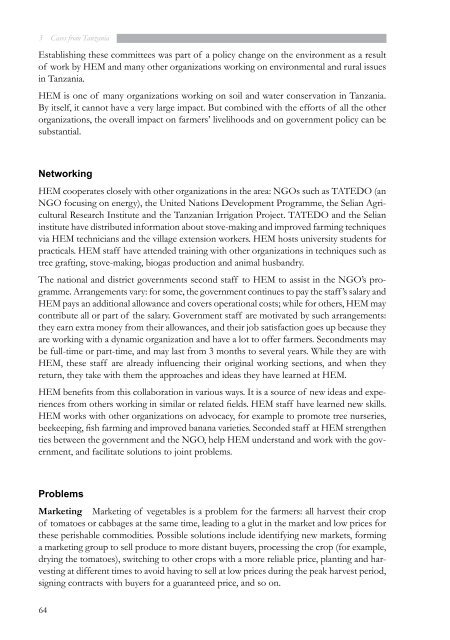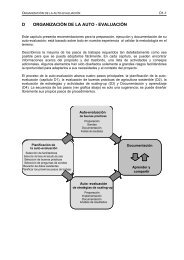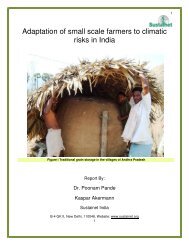cases from tanzania - Sustainet
cases from tanzania - Sustainet
cases from tanzania - Sustainet
You also want an ePaper? Increase the reach of your titles
YUMPU automatically turns print PDFs into web optimized ePapers that Google loves.
3 Cases <strong>from</strong> Tanzania<br />
Establishing these committees was part of a policy change on the environment as a result<br />
of work by HEM and many other organizations working on environmental and rural issues<br />
in Tanzania.<br />
HEM is one of many organizations working on soil and water conservation in Tanzania.<br />
By itself, it cannot have a very large impact. But combined with the efforts of all the other<br />
organizations, the overall impact on farmers’ livelihoods and on government policy can be<br />
substantial.<br />
Networking<br />
HEM cooperates closely with other organizations in the area: NGOs such as TATEDO (an<br />
NGO focusing on energy), the United Nations Development Programme, the Selian Agricultural<br />
Research Institute and the Tanzanian Irrigation Project. TATEDO and the Selian<br />
institute have distributed information about stove-making and improved farming techniques<br />
via HEM technicians and the village extension workers. HEM hosts university students for<br />
practicals. HEM staff have attended training with other organizations in techniques such as<br />
tree grafting, stove-making, biogas production and animal husbandry.<br />
The national and district governments second staff to HEM to assist in the NGO’s programme.<br />
Arrangements vary: for some, the government continues to pay the staff’s salary and<br />
HEM pays an additional allowance and covers operational costs; while for others, HEM may<br />
contribute all or part of the salary. Government staff are motivated by such arrangements:<br />
they earn extra money <strong>from</strong> their allowances, and their job satisfaction goes up because they<br />
are working with a dynamic organization and have a lot to offer farmers. Secondments may<br />
be full-time or part-time, and may last <strong>from</strong> 3 months to several years. While they are with<br />
HEM, these staff are already influencing their original working sections, and when they<br />
return, they take with them the approaches and ideas they have learned at HEM.<br />
HEM benefits <strong>from</strong> this collaboration in various ways. It is a source of new ideas and experiences<br />
<strong>from</strong> others working in similar or related fields. HEM staff have learned new skills.<br />
HEM works with other organizations on advocacy, for example to promote tree nurseries,<br />
beekeeping, fish farming and improved banana varieties. Seconded staff at HEM strengthen<br />
ties between the government and the NGO, help HEM understand and work with the government,<br />
and facilitate solutions to joint problems.<br />
problems<br />
Marketing Marketing of vegetables is a problem for the farmers: all harvest their crop<br />
of tomatoes or cabbages at the same time, leading to a glut in the market and low prices for<br />
these perishable commodities. Possible solutions include identifying new markets, forming<br />
a marketing group to sell produce to more distant buyers, processing the crop (for example,<br />
drying the tomatoes), switching to other crops with a more reliable price, planting and harvesting<br />
at different times to avoid having to sell at low prices during the peak harvest period,<br />
signing contracts with buyers for a guaranteed price, and so on.<br />
64




